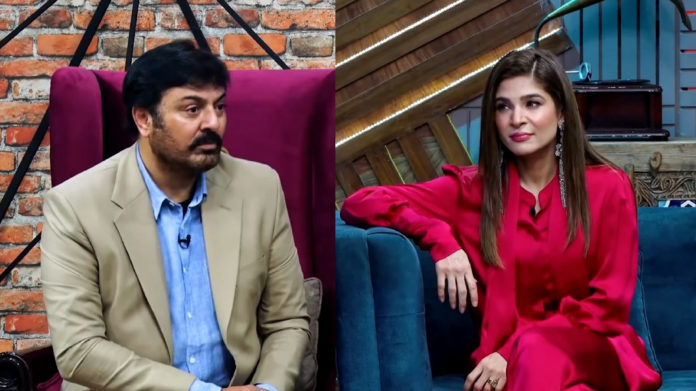The fact that women and minorities face a bevy of varying threats to their existence all over the world is no surprise. Whether you glance at statistics, or peruse through lived experiences, it cannot be denied that women and minorities do, in fact, face harassment and abuse of different kinds. For a survivor to then speak about the incident is a monumental ordeal. One such survivor is actor Ayesha Omar, who has, on several occasions, spoken up about being harassed in the industry. It is thus that Naumaan Ijaz, in a recent interview, came across as thoroughly problematic, while questioning Ayesha Omar about the same.
Context
In a segment of G Sarkar With Naumaan Ijaz, the actor and host began his line of questioning in what can only be interpreted as coming from a place of not only thorough privilege of being a man, but also of sheer ignorance. He deems Ayesha Omar to be “controversial” and draws familiarity between her “bold shoots” and her having spoken about instances in the past – a subtle nod to her having spoken about harassment. He then asks if she tries to incite controversy by doing so, and if it’s necessary to speak up about the past, looking at others who have done so, which he, himself, does not believe necessary, due to it leading to damage to one’s image.
Ayesha attempts to handle the questions with grace, when she is cut off by Naumaan Ijaz asking if one forgets that survival in the society in which we reside becomes harder in such cases. Ayesha responds by saying that she must follow her truth. He then asks if following her truth proved beneficial in any way, where she was applauded for the same. Ayesha responds that she did not do so for applause, to which he asks why she spoke up in the first place.
Ayesha states that she is answerable to herself, and she spoke up for her personal satisfaction. She asks if he agrees, to which he blatantly states that he does not. She even clarifies that she has never named anyone while speaking up. As she is explaining that she supports her truth, he rudely asks, “Kisi ne aap se sach poocha tha?”
This line of questioning makes up a mere two to three minutes of the topic in hand. Yet, there are a plethora of problematic statements in this exchange.
Why Is This Problematic?
Speaking about harassment is hard. There is no easier way to explain it. The trauma often resides deep within an individual, and knowing that speaking up will always warrant more backlash than support is a very real understanding survivors share.
As Ayesha points out in the interview as well, many women face this issue and do not speak up about it. Women are never lauded for sharing their truth, simply because society chooses to point fingers at them, as opposed to the perpetrator of the abuse. Naumaan Ijaz became a microcosmic representation of society in this interview, not only discouraging the sharing of such stories, but handling the line of questioning with a complete lack of sensitivity.
Does He Have A Point, Though?
Many people turn a blind eye to harassment, not only in our society, but globally as well. Very seldom does one hear about holding the perpetrator accountable. The questions posed by Naumaan Ijaz are not unique – they echo the thought processes of a vast majority of society. It is this train of thought that makes people believe women are asking for attention, or seeking fame by speaking up about instances that may or may not have happened.
Yet, let’s take a step back to ask ourselves: how many women have actually cemented their names for the better in society by speaking up? How many women have gained more than they have lost when they out their abusers? Moreover, how many men have suffered the consequences of their alleged actions?
Lack Of Empathy
Journalistic integrity is abysmal in our society. However, Naumaan Ijaz is not a journalist. What could have been a thoughtful conversation between two colleagues or actors from the same fraternity ended up being an almost hostile verbal vomit – one that came from a place of privilege, ignorance, insensitivity, and a general lack of research.
Our severe lack of empathy for survivors manifests in many ways. Whether it is our support for perpetrators, the brutal character assassination of women who speak up, or our ridiculous questions for survivors – as a whole, we must do better, and we must create a safe space for all those who have already suffered enough.
To Sum Up…
There is truth in what Ayesha Omar stated and it must be given due to attention. When one woman speaks up about her instance of harassment, not only does it require immense strength, but she opens up an avenue for other women to gain inspiration and share their truth. Let us inculcate within ourselves the basic human decency to have receptive ears, and create a space for these survivors, instead of silencing them further and shoving them back into the shadows.




